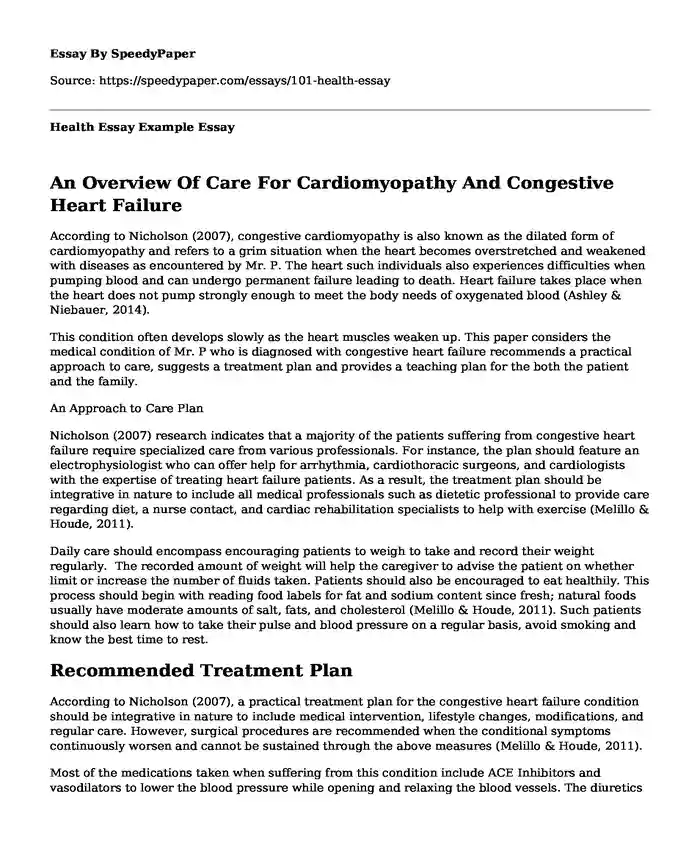
| Type of paper: | Essay |
| Categories: | Health and Social Care Nursing Medicine |
| Pages: | 3 |
| Wordcount: | 692 words |
An Overview Of Care For Cardiomyopathy And Congestive Heart Failure
According to Nicholson (2007), congestive cardiomyopathy is also known as the dilated form of cardiomyopathy and refers to a grim situation when the heart becomes overstretched and weakened with diseases as encountered by Mr. P. The heart such individuals also experiences difficulties when pumping blood and can undergo permanent failure leading to death. Heart failure takes place when the heart does not pump strongly enough to meet the body needs of oxygenated blood (Ashley & Niebauer, 2014).
This condition often develops slowly as the heart muscles weaken up. This paper considers the medical condition of Mr. P who is diagnosed with congestive heart failure recommends a practical approach to care, suggests a treatment plan and provides a teaching plan for the both the patient and the family.
An Approach to Care Plan
Nicholson (2007) research indicates that a majority of the patients suffering from congestive heart failure require specialized care from various professionals. For instance, the plan should feature an electrophysiologist who can offer help for arrhythmia, cardiothoracic surgeons, and cardiologists with the expertise of treating heart failure patients. As a result, the treatment plan should be integrative in nature to include all medical professionals such as dietetic professional to provide care regarding diet, a nurse contact, and cardiac rehabilitation specialists to help with exercise (Melillo & Houde, 2011).
Daily care should encompass encouraging patients to weigh to take and record their weight regularly. The recorded amount of weight will help the caregiver to advise the patient on whether limit or increase the number of fluids taken. Patients should also be encouraged to eat healthily. This process should begin with reading food labels for fat and sodium content since fresh; natural foods usually have moderate amounts of salt, fats, and cholesterol (Melillo & Houde, 2011). Such patients should also learn how to take their pulse and blood pressure on a regular basis, avoid smoking and know the best time to rest.
Recommended Treatment Plan
According to Nicholson (2007), a practical treatment plan for the congestive heart failure condition should be integrative in nature to include medical intervention, lifestyle changes, modifications, and regular care. However, surgical procedures are recommended when the conditional symptoms continuously worsen and cannot be sustained through the above measures (Melillo & Houde, 2011).
Most of the medications taken when suffering from this condition include ACE Inhibitors and vasodilators to lower the blood pressure while opening and relaxing the blood vessels. The diuretics or water pills to help the body get rid of extra water and salt alongside the digoxin that helps the heart in pumping better (Ashley & Niebauer, 2014). The patient should always call the doctor in case of any problem.
Provision of Education both for the Patient and the Family and the Recommended Teaching Plan
Ashley and Niebauer (2014) aver that education can be a powerful tool in helping to transform the perceptions of the individual patients, the family and the society as a whole. The process of providing education to the patient and the family should begin by identifying different health professionals who will carry out the exercise and ensure that they develop tailored messages for effective health promotion. These specialists should teach the patient how to maintain a healthy diet, stick to recommended medications, and conduct physical exercises as per the doctor’s recommendation (Nicholson, 2007).
Conclusion
An appropriate teaching plan should put into consideration the patient’s convenience, understand the recommendable moments for learning and empower all the program participants. This plan should be integrative starting from the services offered at the care facility to the home of the bedridden patients. In this case, patients need to be aware of their training and exercising sessions, understand the times their caregivers will visit them and know when to take medications. A keen consideration of the teaching plan would result in the enhancement of the patient’s life span.
References
Ashley, E. A., & Niebauer, J. (2014). Cardiology explained. London: Remedica.
Melillo, K. D., & Houde, S. C. (2011). Geropsychiatric and mental health nursing.
Sudbury, MA: Jones & Bartlett Learning
Nicholson, C. (2007). Heart failure: A clinical nursing handbook. Chichester, West Sussex: John Wiley & Sons.
Cite this page
Health Essay Example. (2018, Jul 02). Retrieved from https://speedypaper.com/essays/101-health-essay
Request Removal
If you are the original author of this essay and no longer wish to have it published on the SpeedyPaper website, please click below to request its removal:
- 12 Angry Men Logical Fallacies Analysis: Free Essay Sample
- Free Essay on Methodologies of Software Development
- Funding HOPE worldwide: Grants from Federal Agencies
- Annotated Bibliography Entries on Education Programs. Essay Example
- Free Essay Example: Required Resolution
- Essay Sample on Confucius and the Internet: What? How? Why?
- Paper on Comprehensive Analysis of Hypovolemic Shock: Pathology, Causes, Symptoms, and Medications
Popular categories




